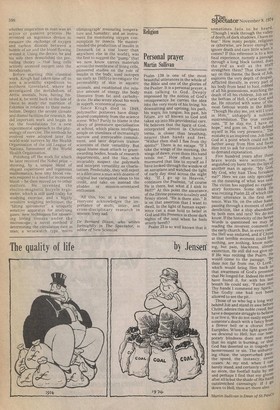Personal prayer
Martin Sullivan
Psalm 139 is one of the most beautiful utterances in the whole of the Bible and one of the glories of the Psalter. It is a personal prayer, a man talking to God. Deeply impressed by the notion of God's 'omnipresence he carries the idea into the very roots of his living; his downsitting and uprising, his path, his ways, his tongue, his past, his future, are all known to God and taken up into His providential care. He believes that the Spirit of God, interpreted almost in Christian terms, is closer than breathing, nearer than hands and feet. 'Wither then shall I flee from thy spirits?" There is no escape. "If I take the wings of the morning, the wings of dawn, even there His hand tends me." How often have I murmured that line to myself as I have looked through the window of an aeroplane and watched the light of early day steal across the night sky. "If I go up to Heaven," continues the Psalmist, "of course He is there, but what if I sink to Hell?" At this point the assurance. of the Divine presence is calmly and firmly stated. "He is there also." It is on that assertion that I want to dwell. In the light of human experience can a man hold to belief in God and His Presence in those dark nights of the soul when he feels utterly bereft?
Psalm 23 is so well known that it
sometimes fails to be heard. "Though I walk through the valley of death; of dark shadows, I have no fear." How many people, religious or otherwise, are brave enough to ignore death and care little when it comes? If this reference is to a less final experience, namely a passage through a long black tunnel, does, the rod as well as the staff ' strengthen them? That classic, essay on this theme, the Book of Job, explores the very depth of despair. Afflicted literally, .in every part of his body from head to foot, robbed of all his possessions, watching the death of all his children, Job sat on the bottom of Hell. Curse God and 'die. He retorted with some of the most famous words in the Bible. 'Though He slay me, yet will I trust in Him," unhappily a sublime mistranslation. The true version runs, "If he slay. me, I have no, hope," and goes on, "I will defenu myself in His very presence." The mistake is an inspired one. Job finds God at 'a point which could not be farther away from Him and faces Him not to ask for consolation but to demand 6/planation. Five hundred years after these brave words were written, an anguished cry burst from the lips of another man in agony. "My God, My God, why hast Thou forsaken me?" Here we can only speculate on the meaning of what was said. The victim has supplied no explanatory footnotes. Some think He was reciting Psalm 22, of which this bitter utterance , is the first sentence. Was He, on the other hand. passing through a moment of utter dereliction, like a ship abandoned by both men and rats? We do, nut know. If the historicity of the Seven Words is questioned we may be, reading the reverent comment Oi the early church. But, in every case' the Hell was endured, and if Christ at that terrible moment could feel nothing, see nothing, know nothing, but pain, blackness, almost extinction, He still did not give 1.1P. If He was reciting the Psalm, He would come to the passage, "Be thou not far from me, 0 Lord," which would bring Him back t° that awareness of God's presence that He longed for. Indeed He most have found it, for with his last breath He could say, "Father int° Thy hands' I commend my Spirit.' The Godly one had not been allowed to see the pit.* Those of us who lag a long waY behind Job and stand in awe before Christ, admire this noble creed, but have a desperate struggle to believe it or live it. We do not easily equate someone's death with a fancy from a flower bell or a chorus from Euripides. When the light goes out we descend to Hell, but our temporary blindness does not mean that no night is burning, or that God has deserted us in tragedy or" bereavement or sin. The unhurrY" ing chase, the unperturbed pace, the speed, the instancy, never ceases. At my end, when I on barely stand, and certainly can run no more, the footfall halts by me and perhaps I find that my glcanr; after all is but the shade of His ban° outstretched caressingly. If I go down to Hell, thou art there also.
Martin Sullivan is Dean of St Paul's


































 Previous page
Previous page